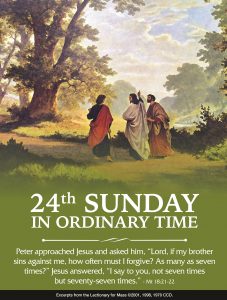 24th Sunday in Ordinary Time, Year A
24th Sunday in Ordinary Time, Year A
Sirach 27:30-28:7
Psalm 103:1-2, 3-4, 9-10, 11-12
Romans 14:7-9
Matthew 18:21-35
Jesus came to offer us “forgiveness” but forgiveness wasn’t “new” with Jesus.
We see it in what Sirach writes, “Forgive you neighbor’s injustice.” He speaks of “wrath and anger” as “hateful things yet the sinner hugs them tight.” We must not hold onto our anger or we deny ourselves “healing from the LORD.”
Today’s psalm also puts together pardon and healing. If we refuse to forgive others, we deny the healing we need inside ourselves from the hurt. If we hold onto our anger, we lock out love and that means not being open to God’s love.
Peter knows what the scriptures taught about forgiveness. Some read verses from the Old Testament as saying we must forgive three times. With this in mind, Peter probably felt pretty talking about forgiving seven times. Surely that was more than enough. Surely Jesus would praise him but Jesus doesn’t.
Instead of praising Peter, Jesus tells him, “not seven times but seventy-seven times.” Jesus is telling us that no matter how generous we have been with our forgiveness we need to continue to be generous in forgiving.
Why must we forgive so many times?
First, ask yourselves how many times you have needed to be forgiven by others in your lifetime. How many times have you needed to be forgiven by God?
Secondly, we need to think about what it means to forgive. Sometimes we think forgiveness means forgetting and remaining best friends.
I think with the little things forgiveness does include forgetting. It just isn’t worth remember. But what about the big things?
We hear about a lot of violence in the world in general, including in schools. I want to go back to an incident in 2006 when a man in Pennsylvania went into an Amish school and shot several students. A few were killed and others seriously wounded. I refer to this incident not for the details of the shooting itself but what followed, forgiveness.
A few years ago I read the book, Amish Grace: How Forgiveness Transcended Tragedy. You can read the book to find out more about the shooting but more important as a lesson in forgiveness.
The preface states, “Whereas in forgiveness the victim forgoes the right to vengeance, pardon releases an offender from punishment altogether… Reconciliation is the restoration of a relationship.” (xiv)
I think when we think about God’s forgiveness we put all three, forgiveness, pardon, and reconciliation, together because if we confess our sins in the Sacrament of Reconciliation that is what God does for us. He forgives, pardons, and reconciles.
The Amish are very good at forgiven. They don’t hold onto grudges but they do believe in consequences. While they believe in consequences, they do not let this lead them to seek revenge (77).
The book provides the following quote from philosopher Joanna North, “When unjustly hurt by another, we forgive when we overcome the resentment toward the offender, not by denying our right to the resentment, but instead by trying to offer the wrongdoer compassion, benevolence, and love” (126).
We can choose to hold onto our anger or we can choose to offer mercy. Holding onto the anger accomplishes nothing. Mercy is our Christian response. We might have good reason to be angry, just like God has good reason to be anger with us for our sins.
It’s that time of year when our faith formation programs start up. Just this week our middle and high school youth groups had their first meetings. Today our K-5 students gather for the first time. At our 10:30 Mass we will offer a special blessing for our parishioners who volunteer as catechists. Today is called “Catechetical Sunday” by our conference of Bishops. Each year they pick a theme. This year’s theme is “Living as Missionary Disciples.”
To live as missionary disciples includes showing mercy to the world. It means telling people about God’s mercy but it also means that we need to show mercy ourselves to those who have wronged us. It doesn’t mean we forget the hurt but it does mean we don’t let it control us.
There is a key element in forgiveness. We cannot let the sinful act continue to control us.
As we talk about God’s forgiveness, we need to show our own need to his mercy. We need to show that we believe that God wants to forgive us. He does! Why else would Jesus have died on the Cross for us?
If we want to admit our need for God’s mercy, we do so by confessing our sins, seeking his forgiveness. I just went to confession myself a couple of days ago. Some of you are old enough to remember when people went to confession weekly. The pendulum has swung and I can get pretty lonely in the confessional sometimes.
What changed?
It started with a better understanding of sin and grace but the pendulum went from thinking we must have done something wrong to seeing little as sin.
Others say that they confess directly to God. God does listen but there is something therapeutic about saying our sins out loud to the priest. There is grace that we receive when we admit our sins. It can be anguishing for us to hide our sins inside. Offering them to God can be a great release with God’s grace. We need to forgive others and we need to be forgiven.
